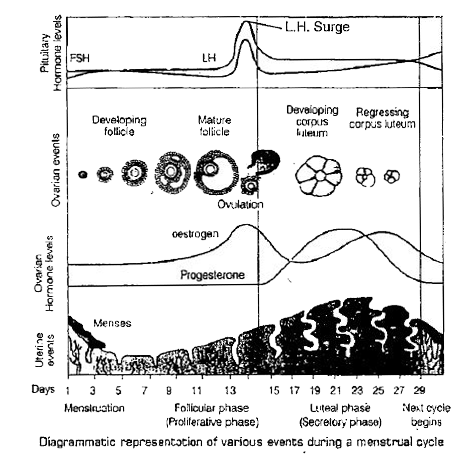What is Menstrual Cycle? Describe the role of FSH, LH, Oestrogens and Progesterone in menstrual cycle. Solution in Punjabi
Menstrual cycle is a rhythmic change in the reproductive organs of the female primates (monkey, apes and humans).
(i) The first menstruation begins at puberty and is called menarche. (ii) Average interval of menstruation in human female is about 28-29 days.(iii) The cyclical events starting from one menstruation till the next one constitute menstrual cycle. (iv) The four phases of menstrual cycle are
Menstrual Phase
(a) Cycle starts with this phase and the menstrual flow occurs for 3-5 days. (b) It occurs due to breakdown of endometrial lining of the uterus. The blood vessels form liquid which along with unfertilised ovum comes out through the vagina. (c) Menstruation only occurs if fertilisation does not takes place. (d) Lack of menstruation generally indicates pregnancy but may also be due to stress, poor health, diseases, etc,
Follicular or Proliferative Phase
(a) Menstrual phase is followed by the follicular phase. (b) The primary follicle in the ovary grow to become a fully mature Graafian follicle and simultaneously the endometrium of uterus regenerates through proliferation. (c) Pituitary and ovarian hormones induce the changes in ovary and uterus. (d) LH and FSH levels increase gradually during this phase and stimulates folliculari development. (e) The growing follicles secrete oestrogens. Both LH and FSH attain highest level during mid-cycle (about 14 day).

Ovulatory Phase
(a) Rapid secretion of LH leading to its maximum level during the mid-cycle is called LH surge. (b) The LH surge induces rupture of Graafian follicle, releasing the ovum called ovulatton.
Luteal Phase/Secretory Phase
(a) Ovulatory phase is followed by the luteal phase. (b) The remaining parts of the ruptured Graafian follicle changes into corpus luteum. (c) Corpus luteum secretes large amounts of progesterone, which is required for the maintenance of endometrium. (d) The thickened endometrium is necessary for the implantation of fertilised ovum and maintenance of pregnancy. (e) During pregnancy, all the events of menstrual cycle stop and menstruation does not occur. In case of no fertilisation, the corpus luteum degenerates. This causes rupture of endometrium leading to menstruation-initiation of a new cycle. (g) In human females, menstrual cycle stops around the age of 50 years called as menopause. (v) Menstrual cycle is absent absent temporarily during pregnancy and lactation periods and permanently after menopause. (vi) Menstruation is also called .Weeping of uterus for the lost ovum. or .Funeral of unfertilised eggs..
Topper's Solved these Questions
- BOOK - BETTER CHOICE PUBLICATIONCHAPTER - HUMAN REPRODUCTIONEXERCISE - SHORT ANSWER TYPE QUESTIONS (MOAT EXPECTED QUESTIONS)3videos
HUMAN REPRODUCTION
- BOOK - BETTER CHOICE PUBLICATIONCHAPTER - HUMAN HEALTH AND DISEASEEXERCISE - LONG ANSWER TYPE QUESTIONS (MOST EXPECTED QUESTIONS)12videos
HUMAN HEALTH AND DISEASE
- BOOK - BETTER CHOICE PUBLICATIONCHAPTER - MICROBES IN HUMAN WELFAREEXERCISE - LONG ANSWER TYPE QUESTIONS (MOST EXPECTED QUESTIONS)2videos
MICROBES IN HUMAN WELFARE
Similar Questions
What is role played by luteinizing hormone in males and females?
03:30View SolutionWrite the causative organism, mode of infection, symptoms and preventive measures of the disease pertussis.
02:25View SolutionExplain the role of microbes in the treatment of sewage.
02:29View SolutionMenstrual cycle is controlled by: 1. Estrogen and progesterone of ovary 2. FSH of pituitary 3. FSH and LH of pituitary 4. Oxytocin hormone
02:26View SolutionIn which duration menstrual cycle both LH &FSH ATTAIN A PEAK LEVEL
02:43View SolutionMenstrual cycle is controlled by
A. Estrogen and progesterone of ovary
B. FSH of pituitary
C. FSH and LH of pituitary
D. Oxytocin hormone04:14View SolutionBoth LH and FSH attain a peak level about.......... of menstrual cycle.
03:36View SolutionWhat is menstruation ? What are the specific actions actions of FSH,LH, estrogens and progesterone in the menstrual cycle ?
03:57View SolutionMenstrual cycle is controlled by I. androgens from Leydig cells. II. FSH and LH of pituitary. III. Oxytoxin hormone. IV. Oestrogen and progesterone of ovary.
03:19View SolutionLH and FSH level during human menstrual cycle increase on :–
03:04View SolutionIdentify the peaks of FSH, LH, Oestrogen and Progesterone hormones through out the menstrual cycle
02:42View SolutionExplain the role of following hormones, with reference to menstrual cycle : (i) FSH, (ii) LH, (iii) Estrogen, (iv) Progesteron.
04:25View Solutionमनुष्यो में मासिक चक्र के दौरान LH तथा FSH का स्तर बढ़ता है-
04:36View SolutionDuring menstrual cycle, both LH and FSH attain a peak level on
05:28View SolutionWhat is the menstrual cycle or menstrual cycle or menstrual cycle? Describe.
04:09View Solution

